by Jenny Rose | Jan 25, 2019 | Connection & Community, Emotional Intelligence, Shadows
I’ve been thinking about shame. It lurks in many of my relationships. I observe it in people around me. I cannot remember a time when I was not deeply ashamed of myself. I’ve written about tribal shaming before, but I’ve never excavated the subject further until now.

Photo by Cristian Newman on Unsplash
Wikipedia has a lengthy page on shame that summarizes different ways in which it has been studied. Assessment tools exist to measure shame and its effects in our lives. Shame has been divided into categories, and distinctions between shame, guilt and embarrassment teased out.
All this information provided me with a lot of interesting context and background, but the subject is not academic for me. I have a problem with shame I want to solve. How do I go about identifying and dealing effectively with the painful feeling of humiliation or distress we call shame?
I learned in emotional intelligence training our feelings are value neutral. Some feelings are painful and others pleasurable, but that doesn’t make them “good” or “bad.” Feelings just are. We all have them, whether or not we allow ourselves to consciously feel them or admit them to others. If we allow ourselves to feel our feelings, they give us information about how we are. Feelings by themselves can empower and enlighten us, guide our choice-making and help us make strong, healthy connections with others.

Photo by John Salvino on Unsplash
Feelings come and go, like the weather, if we allow them to. Refusing to feel a feeling, however, locks it in place, and then we have forged handcuffs and chains for ourselves. The other tricky aspect of feelings is what our thoughts are about them. Thoughts are what lead us into inappropriate action and expression of our feelings.
An emotionally intelligent person recognizes a feeling like rage and takes responsibility for it. In other words, they don’t blame someone or something externally for their rage. That’s a thought. They don’t seek revenge, payback or to re-establish their power over someone they blame as the cause of their rage. They take responsibility for their feeling of rage and discharging it appropriately, knowing none of us think well or make effective choices when we’re in the grip of strong feelings. They also don’t turn the perfectly normal feeling of rage inward against themselves.

Photo by Bewakoof.com Official on Unsplash
After safely discharging rage (hard physical labor, tears, journaling, talking things over, screaming, passionate creative expression, beating up phone books or pillows), the next step is to sit down and have a talk with it. Years ago, when I lived alone, I literally began to sit down and talk with some of my feelings. I’ve written about this previously. I sit in a chair across from an empty chair and imagine myself talking things out with the feeling occupying the other chair. I say something like, “You have my attention. What’s the deal? Why are you so angry?” and then I shut up and listen to my feeling. Feelings have presence. I’ve learned to notice where I experience them in my body, what color they are, their size and shape, their density and texture, their scent and sound. Our feelings are trying to tell us things we need to know, and the more painful, difficult and overwhelming they are the more important their message is.
This is what I have been doing lately with shame. I wait and watch for it, and when it comes I notice and pause. In the middle of a conversation with my partner, I’ll feel shame rise up like a foul smell and I’ll pause and look for what is happening that triggers shame. Something I said? Something I didn’t say? Something he said to me? Something else I’d rather be doing? A subject I don’t want to talk about or don’t care about? What else am I feeling?
After doing this for a couple of weeks, I discover any honest conversation that makes visible my needs and feelings triggers shame. No wonder I feel so burdened if shame is attached to every need and feeling!
Interestingly, during the in-the-moment pauses while I explore all this, more often than not I realize I don’t in fact feel shame at all. It’s become a kind of chronic hitchhiker attached to other feelings.

Photo by Nabeel Syed on Unsplash
A good example is driving. I typically go the speed limit or 5 miles over it, and in bad weather much slower than that. I rarely run late. I hate to rush. I enjoy music and audiobooks in the car and am quite happy driving. I love my commute. The world is full of people, however, who are in a hurry, reckless, and, to my way of thinking, rude. Of course, they think I’m rude for not getting out of their way!
I rarely drive without feeling shame, but I realize now I’m not really ashamed at all of my driving. On the contrary, I think I’m a competent, courteous driver. I’ve also been a lucky driver, because accidents happen to the best drivers out there and I’ve never been involved in more than a fender bender. When someone is crawling up my backside in a snowstorm in the dark on an icy road and I’m blinded by their headlights in my rearview mirrors and have no way to move over and let them by, what I do feel is mad and scared. The shame is about feeling mad and scared, not about my driving choices in that moment. I don’t want some idiot in a big truck to have the power to intimidate me on the road. I resent living in a world where I have to worry about sudden violence and road rage, or being a woman alone at night. I’m furious with people who follow too close, even in good conditions. I hate to be pushed and pressured, and I hate even more to feel I’m in someone else’s way or making someone wait on me. That’s an old trigger for PTSD.
It turns out much of my daily shame is nothing more than a habitual default. A rueful realization, but also good news. Habits can be broken, I’ve had a lot of practice with that.
I’ve never yet successfully broken a habit without replacing a not-so-useful thought or frame with a better one. So, what’s the opposite of shame? If I want to replace shame with something more effective, what would that be?
Shame is akin to contempt. Contempt is the atomic bomb in relationships between two or more people as well as in our relationships with ourselves. Contempt withers love and destroys trust. It’s never constructive. Those who employ it seek power and control over others. Shame and contempt are merciless. Guilt, the recognition of having transgressed against another, can be addressed. We can atone for our actions and words, apologize, take steps to repair the damage we caused. Shame and contempt are without mercy or the possibility of reparation. Guilt says we’ve behaved badly. Shame and contempt say we are bad, we are unworthy, and nothing can ever make us different.
I consulted a thesaurus to look at antonyms for shame and came up with respect. Respect!
Shame: Why are you so stupid and difficult? You’re always in everyone’s way! You don’t belong on the road. Why are you such a goody-two-shoes? No wonder nobody likes you, crawling along like an old lady! Nobody else drives this way. Joe Blow (partner, brother, colleagues, the guy at work who said the roads were fine and scoffed at slow drivers) wouldn’t be driving like this. You do everything wrong. People like you cause accidents because you go too slow.
Respect: Don’t let this idiot drive your car! Go as slowly as you need to. You’ve got good judgement and a lot of experience. These are dangerous conditions and feeling fearful is an appropriate response. I trust you. Don’t let this driver intimidate you. His need to go fast is not more important than your need to stay safe. People driving the way he is cause accidents.
Quite a difference, right?
I suppose there are more elegant ways to grapple with feelings like shame and a trained psychologist or psychiatrist would laugh at me, but I’ve found helping myself is incredibly empowering. My experience of therapy is that having a good guide is invaluable, but even the best guide can’t crawl inside our heads and do the work of staying present and making different choices. That’s all on us. Ditching an ineffective habit is difficult and so is encouraging a new one, but it’s perfectly doable. If I lost my right hand, I would eventually learn to use my left. It would feel clumsy, and no doubt be frustrating, and it would take time, but I would learn to do it. Our brains are surprisingly plastic, and we’re learning more all the time about healing and adapting neurologically and emotionally.
We aren’t born with a feeling of shame. We learn to feel it. Anything we learn can be unlearned. Shame stunts our growth and our joy. Respect is like the wind beneath our wings. I’ve made my choice.

Photo by Yuan Yue on Unsplash
All content on this site ©2019
Jennifer Rose
except where otherwise noted
by Jenny Rose | Jan 17, 2019 | Emotional Intelligence, Feelings
Working in a fitness/rehabilitation center in January makes our cultural and personal obsession with our bodies and looks inescapable. All day long I hear conversations about health, pain, weight loss, exercise and fitness goals and diet. There’s something inescapably seductive about the idea of making a fresh and successful start in a brand new year.
At home, in my peaceful attic where the winter light steals in, poet David Whyte suggests making ourselves big for loss; if we have a healthy interior landscape, we are better able to absorb painful experiences.
I’ve written about making ourselves big, but I was thinking of things like courage, passion, creativity and curiosity, not loss.
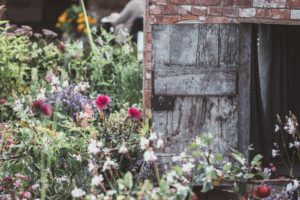
Photo by Annie Spratt on Unsplash
Whyte’s inside-out wisdom, which has caught my attention before, provides a new frame I’ve been playing with as I live my life. It seems everywhere I turn I find this idea of loss and how we manage it. I’ve been reading a memoir entitled “This Life is in Your Hands” by Melissa Coleman. It’s about her childhood with her family on the coast of Maine during the 70s as part of the back-to-the-land movement. It’s a fascinating story encompassing all kinds of ideas, beliefs and discoveries about what it takes to leave much of modern life and wrest a living from the land. It’s also a story about a gradually unraveling family, doing their best to create a life they believe in but ultimately defeated by their ideals and the death of a child.
Coleman writes, “There were no gardeners of grief in our community.”
What a poignant, beautiful line that is. Gardeners of grief. There it is again, I thought when I read it, the idea of making intentional space, even a large space, for a feeling we typically avoid, deny or refuse to deal with.

Photo by NeONBRAND on Unsplash
I wondered yesterday, sitting on the lifeguard stand watching the pool during a water aerobics class, how it would be if we focused New Year goals and intentions on our interior landscape rather than our external appearance. Would more people be more successful in making the changes they say they want? Would support and action in addressing our interior terrain naturally lead to the kinds of external changes so many of us seek?
Loss. What can we say about it? Some loss is so long and drawn out it’s almost chronic, and we become numb to it, though it shadows our lives. Other losses are shockingly abrupt and traumatic, and others still somewhere in between. Loss is painful in itself, but our feelings about who or what is lost can add significantly to our pain, especially if we don’t manage them properly.
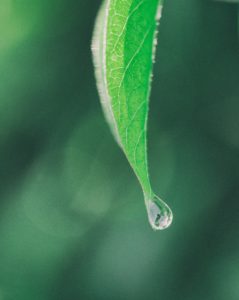
Photo by Aaron Burden on Unsplash
I’ve had two catastrophic losses in my life, though I feel foolish revealing them. The first was the loss of a diner. It was a little ramshackle shack with a spongy floor that dipped and swayed as you walked across it, room for about seven tables with mismatched and broken chairs, and a grease-saturated kitchen. It was less than a five-minute walk from my old house in a tiny Colorado mountain town, and for years I ate breakfast and/or lunch there at least once a week. I was working at the local public school while the diner was in business, so I knew all the high schoolers who bussed, waited, washed dishes and cooked. My own sons worked there in their turn. In the decade after my boys left and I was alone, the diner became like a second home to me. I was often the first customer of the morning, waiting patiently for the door to be unlocked with my travel cup of tea steaming in my hand and a book or notebook and pen under my arm. They made my breakfast without asking, as I always had the same thing, and Amy, the owner, would sit with me, sipping a cup of coffee, while we exchanged desultory early morning talk or were just quiet together.
I always felt welcomed at the diner. I loved it, and those who worked there, and they at least tolerated me with friendliness and kindness. I felt seen. One day Amy told me, with some reluctance, she was closing it down. The endless grind of owning and operating a restaurant had become too much, and it was getting harder and harder to avoid problems with licensing and inspection as the building deteriorated. She had dreaded telling me. We sat across from one another and wept.

Photo by Madison Grooms on Unsplash
The second loss happened just a few weeks later, when the dearest companion of my life, a crippled long-haired orange cat, died quietly at home,
These two losses left me maimed and feeling unable to go on. I no longer recognized my life in that place, though I’d lived there for 20 years, raised children, worked, volunteered, danced and told stories. Strange, to realize the diner and Ranger as the only two pillars holding up my life. Why were these losses so much more terrible than my sons outgrowing the town, the school and me, and leaving? That was extraordinarily difficult and painful, and I thought I’d never recover or fill the hole they left in my days, but I still recognized myself and my life. I wasn’t completely undone. I knew we were all making the right choice to part ways and I would go on.
Remembering, it occurs to me my internal landscape had shriveled and withered without my noticing. Ranger and the diner had provided me with warmth, companionship, acceptance, love and belonging. In those two aspects of my life I was completely honest and authentic. When they were gone I was left with a grueling job that just barely supported me and was highly stressful, a home I loved and had worked hard to create but which was empty and desolate without Ranger, and the feeling that I was little more than a burden and a disappointment to nearly everyone in my life (including myself) and the town in general (with a couple of notable exceptions). I was nothing and had nothing anybody wanted or needed, and my life felt like a lie.

Photo by Louis Maniquet on Unsplash
When I think now about intentionally building an internal landscape, a bountiful landscape with lots of space, I realize the interior wasteland I was trying to live with before. A greasy spoon hole-in-the-wall diner and a cat were the only two things tying me firmly to life. I was not big enough to absorb their loss. I was always busy, but I wasn’t big. All my attention was on trying to please others and get loved.
Is getting a life, being in a life, creating a life about being busy and having things to do, or is it about building an interior landscape? Scientists are beginning to realize how important complexity is in living systems. Perhaps complexity is not about externals, such as how long our to-do lists are or our New Year resolutions, but about the interior ground of our lives. What if we were each able to build a complex interior terrain with not just room but welcome for all our feelings and needs, an interior system that could elegantly break down, absorb and transform loss, rage and fear? What if we nurtured several kinds of healthy relationships, contributed our experience and skills in more than one way and found a variety of creative outlets and activities to enjoy? What if we invited and allowed both loss and gain, joy and despair to dwell in our interior landscape? Would a more varied, complex and honest inner life allow us to find relief and respite from the inevitable losses and changes we experience?

Photo by Ivan Jevtic on Unsplash
It seems to me the answer can only be yes.
Furthermore, if we choose to successfully build and maintain a complex interior landscape, will all the outward things we worry so much about either seem less important or more easily managed? If we’re more physically active and heal our relationship with food because we’re cleaning up and creating our interior landscape rather than because we want to lose weight, will the re-focus of our intention mean less resistance and failure?
All my life I’ve tried to hold back my feelings because I’m afraid of being overwhelmed by them, or of what others will say or think of me. The problem is I can’t pick and choose which feelings to allow and which to exclude. If I’m going to love wholeheartedly, I’m also wide open to the pain of loss. The idea of creating an internal landscape spacious enough to allow every feeling and experience unlimited depth and width is an interesting contrast to my impulse to recoil, withdraw and barricade myself into a small stone cave for the rest of my life.

Photo by Henry Be on Unsplash
Now and then I need that internal cave, certainly. A bolt hole is essential to me. But surely there’s a whole interior world I can build outside the cave when I’m ready to step out of it again, a world with gardens and orchards of feelings and possibility, a world of connections and people to love and learn from, a complex inner terrain in which to get lost and find myself again. Best of all, my interior landscape is solely my own creation. In it, I can be utterly naked and free from concern about what others think of me. I can be fully authentic and honest without fear or shame. I can feel what I feel and have what I need.
Gardening for loss, for fear and for pain. Landscaping for joy, confidence and healing. Welcoming complexity and delving beneath the surface of life and of myself. Making myself big for the hard stuff.
All content on this site ©2019
Jennifer Rose
except where otherwise noted
by Jenny Rose | Oct 18, 2018 | Connection & Community, Emotional Intelligence, Shadows
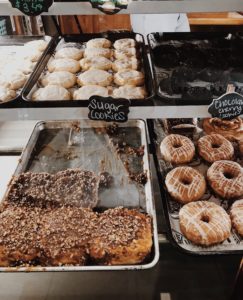 I first heard about toxic mimics as I learned emotional intelligence. The term comes from radical environmentalist author and speaker Derrick Jensen. A toxic mimic is a destructive action, behavior or thing pretending to fill a primary human need. Rape is a toxic mimic for healthy, consensual sex. Sugar is a toxic mimic for food. Addiction is a toxic mimic for managing feelings. A job might be a toxic mimic for contribution. Pseudo self is a toxic mimic for authenticity. Some would argue that social media is a toxic mimic for connection.
I first heard about toxic mimics as I learned emotional intelligence. The term comes from radical environmentalist author and speaker Derrick Jensen. A toxic mimic is a destructive action, behavior or thing pretending to fill a primary human need. Rape is a toxic mimic for healthy, consensual sex. Sugar is a toxic mimic for food. Addiction is a toxic mimic for managing feelings. A job might be a toxic mimic for contribution. Pseudo self is a toxic mimic for authenticity. Some would argue that social media is a toxic mimic for connection.
I believe our modern culture here in the United States, at this moment, rests on an edifice of toxic mimics. People who create, design and sell toxic mimics have a simple agenda: Profit and power. We, the consumers and choice makers, the common people, if you will, happily hand over our power in exchange for the shiny; the new and improved; the seductive promise of success, wealth and love; and the popular. Toxic mimics give us the relief of distraction, instant gratification and the promise of an identity. They help us regulate our mood and feelings.
Toxic mimics have such power over us now that a majority of us (maybe) have voluntarily given management of our country to toxic mimics for human beings.

Photo by Patrick Brinksma on Unsplash
What are the strongest human motivators? Fear? Love? Hate? I could also make a case for denial, but that might be too inextricably bound up with fear to separate. Toxic mimics are deliberately designed and marketed to appeal to the things that drive us at our deepest levels. They are engineered to target our greatest vulnerabilities. They seek to hook us, permanently, helplessly and hopelessly, and they’re so powerful they kill many, many people. Witness the power of nicotine, for example. Toxic mimics promise to fill our lives with everything we want and provide us an identity, but when we employ them we feel emptier than ever. Because we are conditioned to believe buying a product or service will make us feel better, we buy as much as we can as fast as we can, which necessitates a continuous stream of money, a resource that has become one of the most powerful Gods we’ve ever worshipped. Money, one might say, is a toxic mimic for God, or Gods, or whatever word you like to use to communicate the divine.
The deepest irony in this situation is we are the ones who perpetuate the power of toxic mimics. We willfully and intentionally participate. We create demand and gobble up supply. We continue to support advertising, algorithms and the handful of powerful companies who monitor our lives and mine us for information in order to sell us yet more toxic mimics. We applaud and admire what we call “progress”, “growth” and a “healthy economy.”

Photo by Ev on Unsplash
A healthy economy. Healthy for who, I wonder. Healthy for the global system? Healthy for those of us living paycheck to paycheck? Healthy for the children who are victims (yes, I mean victims) of anti-vaxxers? Healthy for people who have no financial resource and thus cannot participate in the latest technology? In a country filled with disbonded children and broken families; rising antibiotic-resistant organisms, including STDs; rising illnesses like typhus which are perfectly preventable with vaccination; astronomical housing costs forcing employed professionals to live out of their cars; broken healthcare and public education systems and a population of obese, metabolically disordered, pharma-dependent, addicted, lonely, suicidal people, we have a so-called healthy economy.
Oh, good. I’m so proud to be an American.
It’s a lie. There’s nothing healthy about what’s happening now, but we’re so stupefied, so numbed, so habituated, that we no longer recognize lies when we hear them. We can’t afford to, because to recognize one means to recognize others, and if the whole thing is based on lies, we’re too afraid to know it. Much easier to cash the insurance check and rebuild, for the third or fourth time, in the same place than take responsibility for facing the effects, long predicted, of climate change.
Of course, insurance companies are not going to continue to subsidize climate change because it destroys their profits, so that might catch our attention — eventually.
 In the meantime, we bend our heads over our handheld, shiny, talking, distracting and instantly gratifying techno-screens or settle down in front of our larger screens and surround sound systems and let the advertising and brainwashing wash over us. We call this life. Isn’t it grand? Isn’t it beautiful? Aren’t you happy?
In the meantime, we bend our heads over our handheld, shiny, talking, distracting and instantly gratifying techno-screens or settle down in front of our larger screens and surround sound systems and let the advertising and brainwashing wash over us. We call this life. Isn’t it grand? Isn’t it beautiful? Aren’t you happy?
A toxic mimic is a promise that never delivers. Sometimes we do it to ourselves. Sometimes we allow others to convince us of the necessity, morality and rightness of our toxic mimics. We’re told they will make us safe. They will make us successful. They will make us healthy and popular, beautiful and beloved. We’re told we have a perfect right to have what we want. We long to believe it. We buy, and then we don’t feel successful or beautiful, so we buy some more. We start giving away our power. We begin to hide our unhappiness. After all, toxic mimics are working for everybody else, aren’t they? Everyone on our favorite social media platform is doing just fine. We conclude there’s something wrong, broken and irredeemably ugly about us. It’s too shameful to admit or talk about. We take even more smiling selfies and post them.
Meanwhile, we elevate and empower not the humanitarians, the natural leaders, the ecologists, the visionary scientists, the emotionally intelligent, the critical thinkers and those who understand complexity and systems, but those who have wealth. Money, that amoral symbol made of paper and metal, is the God we’ve agreed is the most powerful and the most admirable. It’s not so, of course, but we make it so with our belief and our participation. We are driven by our fear of losing economically. We’re evidently prepared to follow the promise of economic power straight to Hell.
Fear is the most powerful hallmark of a toxic mimic. Fear of losing power. Fear of being wrong. Fear of consequences, justice and having to take responsibility. Fear of experiencing our feelings. Fear makes our lives, intellect and hearts smaller, not larger. Toxic mimics don’t meet our needs. They momentarily satisfy, perhaps, our cravings and addictions, our need for stimulation and gratification and our desire for distraction. Ultimately, however, toxic mimics dehumanize us, stop our critical thinking, retard our judgement, destroy our health, disable us from healthy connections and encourage us to hide our authenticity. Toxic mimics feed our rigidity, our ideology, our fear and paranoia, and actively attack our physical and mental health.
Are your needs being met? If you don’t know what your needs are, here’s a needs inventory to look at.
If that question made you cry, or your heart shouted “NO!”, make a list of all your makeup, your clothes, your car(s), your tech, your toys and the other stuff you recognize as part of your identity. Don’t forget your accounts, subscriptions and financial assets.
All that, and your needs are not being met?
Huh. Interesting, isn’t it?
All content on this site ©2018
Jennifer Rose
except where otherwise noted
by Jenny Rose | Oct 11, 2018 | Contribution, Emotional Intelligence
When I went through emotional intelligence training, I learned about three basic human needs: Contribution, connection and authenticity. If these primary needs are not adequately met, our lives don’t work well. I’ve written about my wary relationship with my own needs before. As I explore emotional intelligence, I’m struck by the simplicity of the three basic needs, the paradoxical complexity of each one, and the unique ways, often unconsciously, we each approach getting these needs met. I also notice the way these needs are inextricably woven into each other.
In these first couple of weeks of a new job, it’s been necessary to build a new schedule, which felt overwhelming until I remembered the three basic needs. I’m a creature of habit and I quickly stop assessing how I spend my time once I have a workable schedule. I engage with activities I’m accustomed to engage with and that’s that.

Photo by John Salvino on Unsplash
When I trained as a medical transcriptionist and started working from home, I was motivated by the necessity of earning a living and managing my then-teenage sons as a single mother. Medical transcription was a perfect solution. Gradually, without me really noticing, I allowed the job to become a prison. The boys grew up and moved out. I was promoted twice, but never earned a comfortable living. The job came with intense pressure that triggered my stress and perfectionism. It was isolating. It was difficult physically and keyboarding began to give me overuse injury.
I depended on my inadequate paycheck. It was the only income I had.
I was stuck.
I was aware during the last couple of years I worked as a transcriptionist that the job was no longer meeting any of my needs, aside from the paycheck, but a paycheck is kind of essential. In fact, in my mind it was the essential priority in my life, and I labored away in spite of migraine headaches and increasing pain in my upper extremities and shoulders until the day came when I could no longer keyboard without sobbing and I developed a frozen shoulder. I couldn’t take off my shirt without feeling faint from pain.

Photo by freddie marriage on Unsplash
The hardest thing about that job was not the poor pay, but feeling my contribution didn’t matter. The medical professionals were dictating into a piece of equipment and rarely, if ever, considered the human being trying to transcribe their dictation, unless it was to complain and criticize errors. The company I worked for is a huge global conglomerate on the cutting edge of speech recognition technology and a whole host of other businesses. I was nameless and faceless. All training and in-services were done remotely. Management had a high turnover. Changes happened without notice, like getting transferred to a new book of business. Overtime, when needed, was mandatory. Transcriptionists were expected to work 24/7 and weekend shifts were required.
Many people can type quickly and accurately. It’s mostly a matter of practice. I was a pair of hands and ears racing the clock, along with hundreds of others like me, both here and overseas. The job wanted no authenticity from me or anyone else. It’s a job for robots.

Photo by Edu Lauton on Unsplash
I am not a robot.
I’ve been seeking a new job because I want to start earning income again, but this time I promised myself I wouldn’t take a job that didn’t feel meaningful to me, and I knew exactly what I meant by meaningful. A meaningful job is not about the paycheck. Yes, obviously, I need money in today’s world. Not a lot, but some. Enough to justify my time, travel and commitment. However, the work I do in exchange for a paycheck of any size is only meaningful if it makes a positive difference in the lives of others. I don’t want to be paid for being a robot impersonator. I want to be paid because I contribute something wanted or needed out of my own authenticity.
Working as a member of a team in order to keep people safe, assist patients in rehabilitation, and teaching swimming feels meaningful and allows me to work from the heart. In my little corner of the world I can be part of something healthy and healing for myself and others.
As an ex-people-pleaser, I endeavored for most of my life to make a positive difference in the lives of my family and immediate connections. I worked as hard as I could at it, and making a meaningful contribution was my top priority. In spite of all my efforts, I failed. In fact, it seemed the harder I tried the more obnoxious I was to those around me. Naturally, I concluded that I was nothing. I had nothing to offer that anyone wanted. It would be better for everyone if I disappeared and relieved them of the burden of my presence.
Two important things I’ve learned from those years are people pleasing doesn’t work, and some people are determined never to be pleased. I learned to define for myself what a “good” job is. I began to seek paid work I enjoyed as much as volunteer work and kept my focus on the feeling of making a positive contribution.

Photo by Cristian Newman on Unsplash
I see and hear a lot of discussion about the increasing problems of loneliness and depression, and I suspect many of those affected feel unable to make a meaningful, authentic contribution in their families and/or communities. Somewhere along the way we decided a paycheck is more important than the quality of our contribution, but ultimately, as human beings, no paycheck is an adequate substitute for feeling our contribution matters. Our culture does not necessarily reward authentic contribution. We like our infallible robots and good soldiers, those who do and say exactly what they’re programmed to do and say. Loose cannons like me are a problem nobody wants in the classroom or the boardroom.
I’m sorry I believed for so long I had nothing to contribute. It made me miserable and was the root of many destructive choices. Now I believe we all have a great deal to offer, and someone out there needs exactly what we can contribute. What would the world be like if every man, woman and child truly felt they had something unique to give that made a positive difference in just one other life? What if contributing and receiving contributions were not tied to money? What if we all woke up in the morning knowing the world is a better place because of our presence?
What would it take to make that a reality for everyone?
I’m fortunate to have found a way to make an authentic, meaningful contribution combined with a paycheck. Not everyone is able to do that. But everyone is able to do something. Plant a tree. Walk dogs living in animal shelters. Visit hospital patients. Assist in schools, day care facilities or retirement homes. Volunteer to answer a hotline. Buy a cup of coffee for a homeless person. Teach literacy.
Someone out there needs what we can give. Someone is waiting for us. All we have to do is go find them.
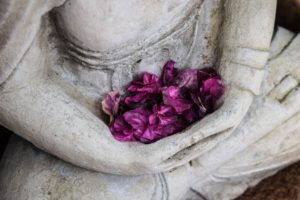
Photo by Chris Ensey on Unsplash
All content on this site ©2018
Jennifer Rose
except where otherwise noted
by Jenny Rose | Oct 4, 2018 | A Flourishing Woman, The Journey

Photo by Aaron Burden on Unsplash
It’s autumn in central Maine, and the leaves are falling. Sometimes they flutter in the arms of a sly little wind under a crisp blue sky, skittering across the road in front of the car, turning me into a more cautious driver than usual because they look so much like a squirrel or chipmunk. Other days they’re torn from the trees by rain and heavy, tropical air under low grey clouds, misty at their trailing hems.
So many leaves in so many shades of copper, bronze, orange, red and yellow. A sodden chaos of leaves underfoot in the rain and an airy whirlwind of them on dry, bright days. It’s as though the trees have been holding their breath all summer and now they relax and exhale, releasing the tension of production, growth and photosynthesis, easing themselves from yesterday’s clothing and burdens, shaking and stretching in naked freedom and settling down with a sleepy grunt for winter.
Bits of the world, leaves, songs
scatter in painted light.
The days
break. –Carol Frost
The past hours, days, weeks and months litter the ground, trodden, damp and fading. Their stories, whispered to the wind, of nest and hollow; bird, insect and animal; stars and rain and dew and the secret underground life of root, soil and mycelium, are lost. From their bodies new stories for the next cycle and generation of life will green and grow.

Photo by Vanessa von Wieding on Unsplash
I envy the trees their grace and patience. They know how to let go. They turn change into glory. They understand surrender to the fading light and changing tilt of the planet.
I, on the other hand, am not so graceful. Starting a part-time job, even doing something I love and am familiar with, has me wild-eyed and overwhelmed. My carefully constructed and comfortable routine is in pieces. I can’t turn the calendar page and fill in my accustomed schedule. Horrors! Now the days ahead are as naked as the bared trees, allowing me time to reconsider the true shape of things. I think of periods of change as bone time. I can’t see the bones of my life when the calendar is predictable and lists guide me through the day. Habit and routine are powerful, and after a time I stop noticing if I’m staying in balance, managing my time and taking care of my needs well. It’s only in these periods when all my schedules, lists and calendar pages are so many leaves of paper tossed onto the floor that I see the bones again.
To inventory our bones is to let go of possessions, distractions, noise, activity, thoughts, beliefs, habits and behaviors and ask ourselves what our true shape is. What are the deepest pieces of our body and soul? What is necessary in order to express our highest purpose? What destroys our time, energy and joy, and what liberates them?
Can we let go of what’s no longer useful? Can we give it to the wind, to the air, to the frost and rain and snow? Can we give it willingly, freely, with grace and beauty?
Yes, I can let things go.
But grace and beauty are noticeably absent just now!
Still, the trees in this season comfort me and show me the way. They’re not worried about next month, next week or tomorrow. They don’t seem to mind change. They release yesterday’s leaves with careless abandon and show their bones proudly to the sky. They know who they are and they take what they need without apology or shame. They rest in the security of the endlessly turning cycles and seasons.
I don’t think I’ll ever achieve their wisdom or serenity.
On the other hand, I know something about my own bones because life gives most of us more than one chance to begin again, and I’ve had lots of practice. I know shortly I’ll be back in a steady, effective, predictable routine that accommodates my new job as well as my current needs and priorities.
wind tugs leaves away
my hat begs to follow
guide me wind the way
you’re lost i’ll be lost — Kim Robert Stafford
Life is change, and change is life. Old conditions give way to new conditions, and the process is always happening, no matter how stuck or helpless we feel. Chaos comes, picks us up by the scruff of the neck, gives us a good shake, and we find ourselves flung into something new, which will in turn gradually fade away.
Leaves fall. Light wanes. We are lost, torn away from what’s familiar, and then the way ahead opens before us and we’re found again.
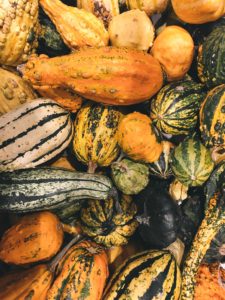
Photo by Brigitte Tohm on Unsplash
All content on this site ©2018
Jennifer Rose
except where otherwise noted





















